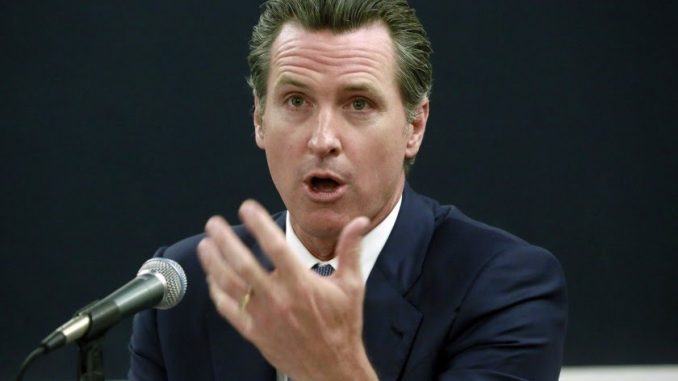
The measures Gov. Gavin Newsom enacted to slow the spread of the coronavirus and his plans to unwind them may discriminate against religious groups and violate their constitutional rights, the U.S. Justice Department warned in a letter Tuesday.
In a three-page letter to the governor, Eric S. Dreiband, an assistant attorney general and the head of the Justice Department’s civil rights division, said Newsom had shown “unequal treatment of faith communities” in restricting their abilities to gather and ultimately reopen.
“Simply put, there is no pandemic exception to the U.S. Constitution and its Bill of Rights,” Dreiband wrote.
Newsom’s office had no comment beyond confirming that it had received the letter.
Dreiband raised issues both with California’s stay-at-home order and Newsom’s plan to roll it back. While worshipers cannot gather in person, even while following social distancing protocols, California has deemed employees in the entertainment and e-commerce industries essential and allowed them to continue working in person, “regardless of whether the product they are selling and shipping are life-preserving products or not,” Dreiband said.
“This facially discriminates against religious exercise,” he said.
Moreover, Dreiband wrote, the governor has permitted restaurants, shopping malls and offices to resume operations in the second phase of his plan to reopen California’s economy, but houses of worship cannot hold in-person services until its third, later phase.
“The Constitution calls for California to do more to accommodate religious worship, including in stage 2 of the reopening plan,” Dreiband said.
In April, the Justice Department intervened in a dispute between a Mississippi church and the city of Greenville, whose police officers had broken up a service held in the church’s parking lot. At the time, Atty. Gen. William Barr said religious groups “must not be singled out for special burdens.”
For the most part, religious institutions in California have followed the state’s stay-at-home rules, canceling services and curtailing in-person contact.
A handful of churches, however, have flouted these rules. In Butte County, public health officials upbraided a congregation for holding an in-person service for Mother’s Day, defying county orders. One churchgoer has since tested positive for COVID-19, potentially exposing 180 other attendees to the virus, according to county officials, who have since tried to track down every attendee and instruct them to self-quarantine.
“For 7 weeks we have been kept out of our church and away from our church family,” the church’s pastor, Mike Jacobsen, wrote on Facebook. “I am fully aware that some people may not understand that for our church it is essential to be together in fellowship.”
Several churches and parishioners have asked federal judges to keep Newsom from enforcing the restrictions on worship. None so far have been successful.
Wendy Gish, a parishioner at the Shield of Faith Family Church in Fontana, had asked a judge in Los Angeles to strike down the prohibition. “My sincerely held religious belief is that God commands me, and other believers, to regularly come together to worship him,” Gish said in a declaration.
U.S. District Judge Jesus G. Bernal ruled against her.
“An in-person religious gathering is not analogous to picking up groceries, food or medicine, where people enter a building quickly, do not engage directly with others except at points of sale, and leave once the task is complete,” he wrote. “Instead, it is more analogous to attending school or a concert — activities where people sit together in an enclosed space to share a communal experience.”
In Sacramento, a federal judge denied a similar request from Cross Culture Christian Center, a church in Lodi.
“Even in times of health, government officials must often strike the delicate balance between ensuring public safety and preserving the Constitution’s fundamental guarantees,” U.S. District Judge John A. Mendez wrote. “But during public health crises, new considerations come to bear, and government officials must ask whether even fundamental rights must give way to a deeper need to control the spread of infectious disease and protect the lives of society’s most vulnerable.”
*story by The Los Angeles Times